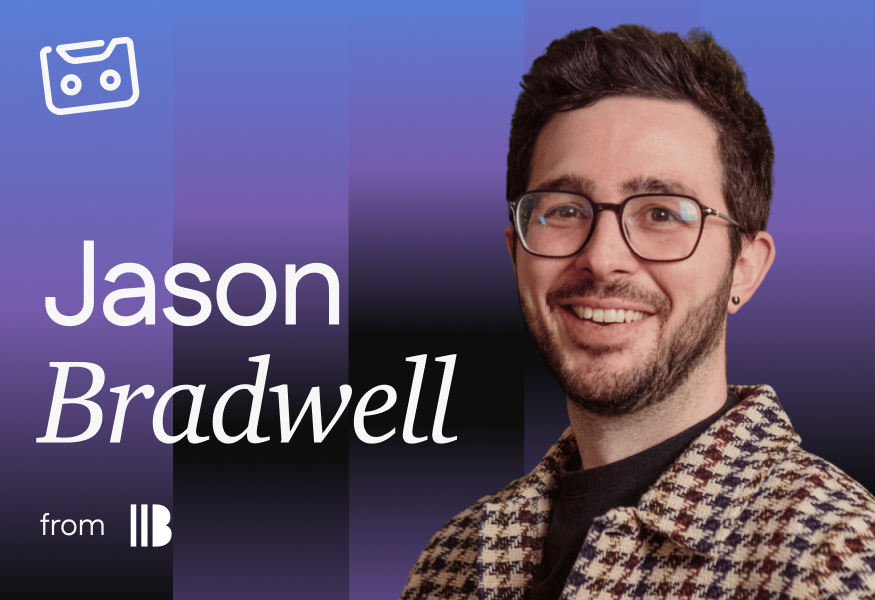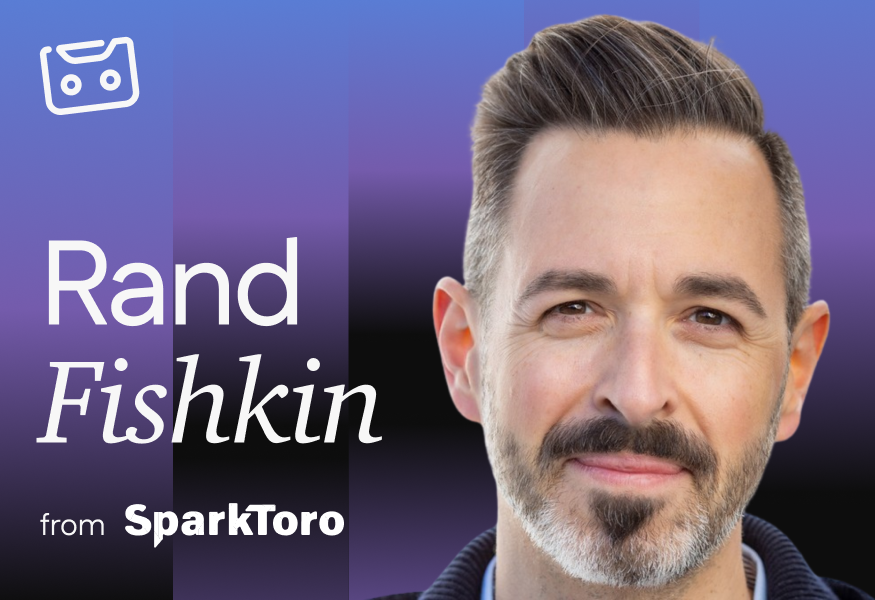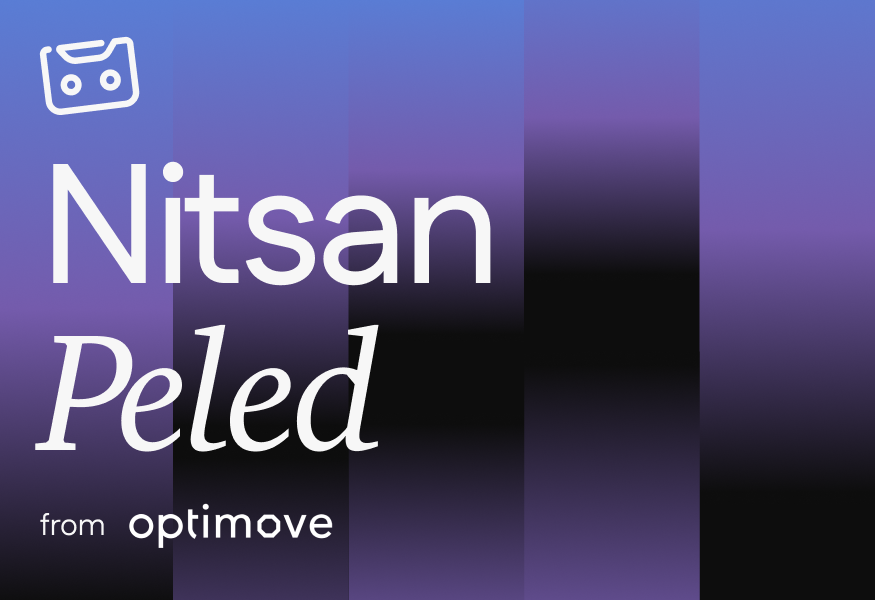Jason Bradwell is a B2B marketer with no formal marketing training.
Before he found his way into the world of marketing he worked in a sales role for a small video streaming company. Before that, he was a drama graduate with big dreams of a life treading the boards.
And it’s the lack of formal training and background in drama that make Jason the brilliant marketer he is today.
He hasn’t come from the stuffy and sometimes bland world of B2B marketing.
This gives him a fresh perspective.
One that he uses to make B2B a little less boring via The B2B Bite newsletter and B2B Better podcast, and in his role as Senior Director of Product Marketing and Communications at Deltatre (which happens to be one of the biggest companies you may never have heard of).
Trust me when I say, my life would be much duller without Deltatre.
From the changing face of B2B comms to thinking outside of the box to using your marketing experience to help others, here are some of the best bits from 35-minutes of podcasting gold.
Embrace every idea
Standing out from the crowd has become a classic B2B trope. We all know that’s what we need to do to get attention, but that doesn’t make doing it any easier.
If you're a small team going up against established names, getting people to give you a second look is hard work. You need an angle that helps you reach people in a way that other companies aren’t.
To find this, Jason is an advocate of embracing every idea, no matter how silly it may seem.
“In my improv days, there was a game we used to play called the ‘yes’ game. And essentially, you have people come onto the stage and just start improvising and couldn't say ‘no’ to the situation. It doesn't matter how wacky it was. If you were just pretending to be at a bus stop, and someone said, ‘Here is my pet salmon’, you just had to kind of go with it.
“And that kind of thinking, I think, serves marketers really well, right. Explore every creative avenue. Don't let your own expectations of a situation hold you back from exploring it.
“If your team is small and intimate and working in the trenches with each other every day, I think taking that attitude of, if you've got a great idea, let's just identify and hypothesize on what that idea is gonna deliver. And let's just try it out. You need to kind of adopt that kind of startup mentality.”
Look at what’s happening in your industry and talk with customers, then combine these things with what you do better than the competition to come up with a table full of the strangest, wackiest, and most obvious ideas you can think of. Because one of these ideas might be your ticket to standing out.
Conventional methods of reaching B2B buyers are changing
In a recent edition of The B2B Bite, Jason tells the story of Tony Piloseno, the paint mixer who became a Tik-Tok star with 1.4 million followers and got fired by Sherwin Williams for sharing videos of himself doing his job. Tony immediately got another job at Florida Paints, who let him carry on making videos. On the back of this, Florida Paints got their name recognised worldwide.
It highlighted two things:
- The benefits of branding
- The risk of getting left behind by not investing in branding
The landscape is evolving and B2B companies need to catch up.
“Conventional methods of reaching B2B buyers via marketing are drastically changing. And that change has been accelerated through COVID.
“With COVID having changed the means in which we are reaching B2B buyers through digital platforms, suddenly the emphasis on brand has become a lot more important. Because now the playing field has been levelled, right? To a degree, it's not about how big a trade booth can you afford to buy or can you afford to get your CEO speaking on a keynote slot right on the main agenda of a show.
“Any B2B company can go out there and start creating great content and publishing it across their social media channels, perhaps putting a little bit of paid behind it as well, building up an email list, thinking of themselves as a media company. Anyone can do that. The barrier to entry is lower.
“So that is where investment in brand suddenly becomes very important. Because if you're just pumping out crappy content that would look as at home on your competitor's website as it does on yours, you’re just not going to stand out from the crowd.”
As well as methods of communication changing, those in charge of budgets are too.
Where it was once Baby Boomers and Gen Xers making buying decisions, the power is now in the hands of millennials.
“Millennials have a greater influence over the B2B buying decision making [process] within their organizations than ever before.
“I think the stat is 74% of millennials who work in B2B companies have an influence over the buying decisions of their company. They over-index on web and social media. Over 70% of 21- to 30-year-olds use social media in a business context every day, versus only 45%, I think, of between 41 and 50-year-olds.
“So, you know, you've got this kind of new wave of B2B buyers who are coming through the ranks now and increasingly have influence over the decisions that companies are making. And they engage with companies in different ways.
“They have been influenced by the ease of accessibility of B2C products. They're used to seeing how much an Uber is going to cost on their app. So they expect the same from MailChimp or Shopify or these kinds of B2B companies that are clearly being influenced by these B2C organisations.”
Florida Paints is a great example of a company thinking about branding. Jason also points to document database, MongoDB.
“I think their marketing is phenomenal because they are clearly a brand.
“They’re investing in these kinds of memory-based activities that cement them as an organisation in the minds of their potential customers. They ran a great campaign at the tail end of last year, where they created a kind of interactive thriller, in the form of like what you may have seen on Netflix, where you can kind of choose throughout the movie, like the Black Mirror special.
“They created this 20-minute interactive thriller that was an editorial piece, you know, it was a mini-movie. But it was designed to kind of talk to some of the themes that its flagship product, MongoDB Atlas, provides. And it was targeted at an audience that doesn't like advertising.
“I don't know the results because I think the campaign's still ongoing, but to me, it's something that I'm not going to forget. And if I'm ever in a position where I'm in the market for whatever MongoDB is selling, I will just think of them straight away and be more inclined to explore their proposition versus their contemporaries who may offer the same thing.”
Good branding puts you front of mind. It helps customers know what to expect and connect with your company emotionally. And that emotional connection is what builds relationships and forges the loyalty that keeps them coming back.
If you’ve never thought about how B2B buyers perceive you, now’s the time.
Can you occupy a space your competitors aren’t in?
Being open to every idea and working on your brand are two ways of standing out in B2B. Another, which ties in with the first two takeaways, is the Star Trek power play—boldly going where no B2B company has gone before.
“It's just about kind of thinking outside of the box, right? Like, yes, you can put out a white paper or a case study, and there's a place for that. But is there something else you can do too? Can you occupy a space that none of your other competitors are occupying?
“Twitch, for example. You know, I wrote about Twitch in my newsletter a few weeks ago. No B2B brands — apart from MongoDB funnily enough — that I've seen are actually on Twitch. And why not, right?
“The lines between the modern-day B2B buyer’s personal and professional lives are blurring. They're working more than they've ever worked. They’re time-poor. One second they may be on their computer looking at a tech spec, the next they may be jumping onto a League of Legends live stream.”
Deltatre uses Twitch to run work workshops and host masterclasses aimed at the developer community. Both have proven to be a success.
“[Hosting on Twitch] in of itself may not deliver this quarter a revenue metric, in the sense of we may not be able to measure, ‘Look, we hosted this 90-minute Twitch stream and that resulted in this lead coming through’. But none of our competitors are doing it.
“And, you know, we're getting good numbers in terms of who's actually tuning in to watch them. It's giving us content that can be reused and repurposed across the rest of our channels. And it's talking to a subset of our potential target market who may not be ready to buy today, but may be ready to buy in a year's time.”
When others zig, you zag.
It’s up to marketers to sell the benefits of branding
While going onto a new platform gives you the chance to capture an audience that other companies are blind to, you may have to play the long game — investing now to reap the rewards in six months or a year from now.
In the traditionally sales-driven world of B2B, this can be a tough sell. And Jason believes it’s up to marketers to get the green light.
“I view it as our responsibility to sell the benefit of brand building to our leadership teams.
“And it's tough, right? If you're approaching someone who's in a position of assigning your budget, like a CFO or a finance director or CEO and you’ve got two parties going to them — one on the sales activation, demand generation side and one on the brand-building side. And the first group is saying, ‘You give me £100K and I'm going to deliver you 10,000 leads this quarter.’ And the other one is saying, ‘You give me £100K and I'm going to set up some Twitch streams, and I'm not quite sure what that's ultimately going to yield this quarter.’ You can kind of see from a leadership position where that money should go.
“That's fair. [But] as B2B marketers who are interested in investing in brand building, we do need to make that case.”
Making your case is done by showing the long-term benefits of brand building, from positioning yourself as the go-to company when customers are ready to buy to becoming a place where employees want to work. And it’s strengthened by having backup.
“[Find the] internal champions within your organisation who do believe.
“Start with HR. Find out what HR targets are for that year. [For example], ‘We want to hire 20% more engineers than we hired last year.’ Okay, great. Well as marketing, let's think of some brand-building activities that will help HR achieve that objective. Let's get on to it. Let's start creating highly technical developer-led content that will appeal to that market and will help HR increase the percentage of engineers we can hire this year.
“Once you've got that, you could then have a stronger case to go into your leadership team and say, ‘Look, we did this small campaign, we got a result. Imagine what will happen if you give us the budget and the support we need to really go for this.’”
Learn while teaching others
In an episode of Maker Mixtapes on podcasting, Shopify’s Kristen LaFrance talked about the importance of starting with a reason.
“Before you start any kind of show, you have to figure out, what's your premise? What's your stance? And what is your show? What's the purpose of it for the audience? Why do you exist?”, she told Tom.
Jason’s reason came from a thirst for knowledge and a want to teach.
“The podcast came about because I said, ‘Look, I want to continue to educate myself, but I don't want to go back to school. So I'm just gonna interview people that I admire and respect and I think are doing a killer job in their respective patch of the marketing ecosystem.’
“Effectively, it's like me being able to put together my own curriculum with the professors of my choosing. You know, I can reach out to anybody and say, ‘Look, can I grab you for 35 or 40 minutes? Let's just talk about what it is you do. And let me ask you some questions I would ask a teacher. And hey, let's publish it out there and share with the world this great knowledge you've accumulated.’”
The podcast was followed by The B2B Bite. Though there are no guests here, its reason for existing is along similar lines.
“The newsletter is more about me sharing my thoughts and experience on B2B marketing in general. Because if I don't write it down, I'll forget it.
“There's no real major agenda behind it other than I just really enjoy sharing my insights with the marketing community in general and learning from the marketing community.”
Reciprocity in full effect.
If you’ve learned something interesting or useful, share it. If it helps even one person, it’s all worth it.
It’s fine to be yourself on Twitter
Long before I heard Jason’s voice on the podcast or found out he worked for a company that’s responsible for 90% of the sports and entertainment content I consume, I knew him from his entertaining and insightful tweets.
Twitter isn’t always the nicest place to be. But it can be. Jason credits the Twitter marketing community for giving him the courage to start his podcast and newsletter. He’s also aware it can be clicky and cynical.
But you know what beats clickiness and cynicism? Fun.
“Have fun. Because, I mean, if social media is not fun you shouldn't be doing it.
“If you are engaging with marketing Twitter, or you're going to start engaging with marketing Twitter, it's absolutely fine to be yourself. You don't have to talk about marketing all the time. I tweet, like 60% of the time, about how my toddler keeps me on my toes.”
“What I've loved about, you know, meeting people on Twitter, is not learning from them from a marketing point of view, but learning who they are as people and building real personal connections. [It’s] the first time, I think, in my entire life on social media I've ever experienced that.
“So yeah, if you're involved in marketing Twitter, you know, just have fun, alright? Show us who you really are. Because there is a community of people out there from my experience that are ready to embrace you.”
What a beautiful way to round off a lovely chat.
Meet the makers
Maker Mixtapes is a podcast about the entrepreneurs, creators, and marketers building impressive things in their field. From content marketing to YouTube and growth, agency life to e-commerce and SaaS, this podcast aims to dissect and share lessons from their success.
Listen to Jason and other episodes from the brightest minds in tech and business on Spotify or Apple Podcasts.













